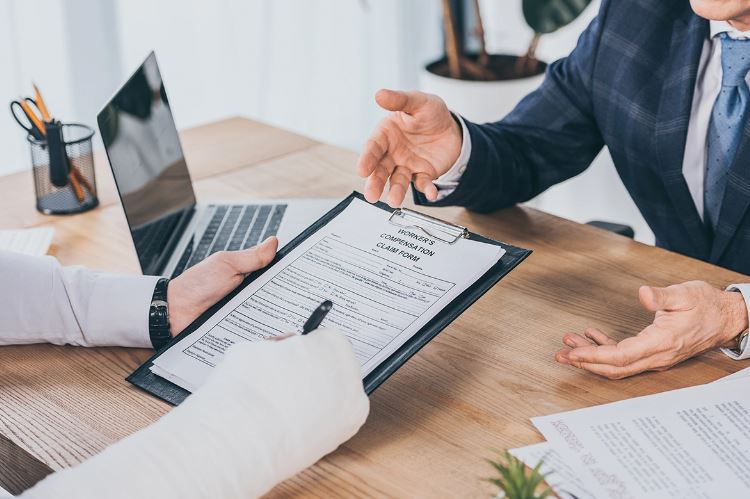Suffering an injury at work can be a daunting experience. It can lead to the accumulation of medical bills, hinder your work, and leave you uncertain about how to navigate the intricacies of workers’ compensation claims.
This is where a proficient workers’ compensation lawyer comes in, acting as your advocate to secure the benefits you are entitled to. However, with numerous lawyers available, how do you determine the best one for your case? This guide will provide you with the necessary knowledge and resources to make an informed decision.

If you’re planning to file a workers’ compensation claim, hiring an experienced lawyer can be extremely beneficial. The laws related to workers’ compensation may differ across states, and the claims process can be complex. An experienced lawyer can help ensure that all the necessary paperwork is filed correctly and on time, gather evidence to support your case, and negotiate with the insurance company on your behalf.
When looking for a workers’ compensation lawyer:
- Experience: It’s important to choose a lawyer who specializes in workers’ compensation law with a proven track record of success in handling cases similar to yours.
- Communication: Hire a lawyer who is easy to reach, explains things clearly, and keeps you informed about the progress of your case.
- Fees: Most workers’ compensation lawyers work on a contingency fee basis, meaning they only get paid if you win your case. Their fee is typically a percentage of your settlement or award.
- Location: Ideally, you should choose a lawyer who practices in your state and is familiar with local workers’ compensation laws.
To find a qualified workers’ compensation lawyer
- State Bar Associations: Every state bar association has a lawyer referral service that can connect you with pre-screened attorneys in your area.
- American Bar Association (ABA) Workers’ Compensation Section: The ABA provides information on workers’ compensation laws and a directory of lawyers who specialize in this area.
- National Association of Workers’ Compensation Attorneys (NAWCLA): NAWCLA is a professional organization for workers’ compensation lawyers. Their website has a directory of member attorneys.
- Online Directories: Several online legal directories allow you to search for workers’ compensation lawyers in your area based on location, practice area, and client reviews. Be sure to consider the lawyer’s qualifications and experience in addition to reviews.
It’s important to schedule consultations with several lawyers to ask questions and get a sense of their personality and approach. Moreover, don’t hesitate to negotiate fees, as many lawyers have standard fee structures, but there may be some room for negotiation. Lastly, trust your instincts and choose a lawyer who you feel comfortable with and who will fight hard for your rights.
It’s important to understand the type of injury or illness you have when seeking a workers’ compensation lawyer. This can help you find a lawyer with experience handling similar cases. Workers’ compensation cases can involve physical injuries such as broken bones, sprains, burns, and repetitive stress injuries, as well as occupational diseases caused by long-term exposure to harmful substances or repetitive motions. Mental health conditions can also be triggered by work-related stress and trauma.
When searching for a lawyer, it’s important to consider their track record.
Look for lawyers who have successfully handled cases with similar injuries or illnesses to yours and outcomes that align with your goals. It can also be helpful to find a lawyer with experience against specific insurance companies, as some can be notoriously difficult to deal with.
Client reviews and testimonials can offer valuable insights into a lawyer’s communication style, approach to cases, and overall effectiveness. A good lawyer is not just skilled, but also a good fit for you. During consultations, assess how comfortable you feel with the lawyer, whether they explain things clearly, answer your questions patiently and thoroughly, and are responsive to your concerns. Building trust with your lawyer is essential.
Some lawyers may specialize in specific types of workers’ compensation claims, such as construction accidents or occupational diseases. This focused expertise can be an advantage if your case falls within their specialty.
When consulting with lawyers, come prepared with a list of questions.
Ask about their experience handling cases like yours, their typical fee structure, how they’ll keep you informed about the progress of your case, and their strategy for maximizing your compensation. The answers to these questions will help you understand the lawyer’s approach and determine if they’re a good fit for you.
Remember the following tips for a comprehensive approach to finding the right lawyer:
Awards and Recognitions:
Check if the lawyer has received any awards or recognition from legal organizations or publications. Awards like “Super Lawyers” or “Best Lawyers” can indicate their expertise and reputation within the legal community. But don’t rely solely on these accolades. Investigate the selection process and consider them alongside other factors.
State and Local Bar Associations:
Check disciplinary records of licensed attorneys with the state and local bar associations. This will ensure that the lawyer you choose is in good standing and has not faced any disciplinary actions.
Technology and Resources:
Check if the lawyer uses technology to improve efficiency and communication in your case. Do they offer a secure online portal to access case documents and updates? Do they use technology to streamline communication or case management?
Contingency Fee Agreements:
Most workers’ compensation lawyers work on a contingency fee basis. This means they only get paid if you win your case. Their fee is typically a percentage (usually between 20-40%) of your settlement or award. However, some variations exist. For instance:
Advancements:
Some lawyers may offer advancements on costs associated with your case. This can be helpful if you’re facing financial hardship due to your injury. Be sure to understand the terms of repayment for any advancements.
Hybrid Fee Agreements:
In some cases, a lawyer may propose a hybrid fee structure combining a base fee with a contingency fee. Carefully review and understand any hybrid fee agreements before signing.
Location and Accessibility:
While some communication can occur virtually, in-person meetings may be necessary during your case. Consider the lawyer’s location and how accessible they are for meetings. If travel is a challenge due to your injury, choose a lawyer with a convenient location or one who offers video conferencing options.
Building a Relationship:
The lawyer-client relationship is a two-way street. Be prepared to actively participate in your case. Provide the lawyer with all relevant information and documentation promptly. Communicate openly and honestly about your concerns and expectations.
Conclusion
It’s important to find the right workers’ compensation lawyer to ensure that your case has the best possible outcome. To make an informed decision, you should consider the factors outlined in this guide and use the resources provided. Remember, a skilled lawyer can help you navigate the complexities of the workers’ compensation system and obtain the benefits you’re entitled to. If you’ve suffered a work-related injury, don’t hesitate to seek legal help.






